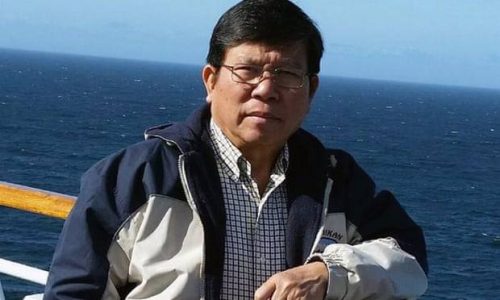
Retired Australian baker loses appeal in Vietnam on controversial financing terrorism charges
A 70-year-old Australian man convicted in a controversial trial in Vietnam for anti-government terrorism offences has told a court he loves Vietnam and its people and was only ever a peaceful advocate for democratic reform.
“I want Vietnam to progress and the people to enjoy freedom,” he said.
But on Monday Chau Van Kham’s appeal was dismissed by a judge in Ho Chi Minh City who insisted his 12-year prison sentence be upheld.
Chau, a retired baker from Sydney, will be 82 when he is released if he serves his full sentence for “financing terrorism”, which is related to his membership of a pro-democracy group, Viet Tan.
His eldest son, Dennis, told the United Nations last month that his trial was a “charade”, and his sentence “effectively a death sentence”.
In Chau’s single-day, judge-only trial, held simultaneously with four other people in November, he was tried and convicted and sentenced to 12 years jail, all within four hours.
The court was effectively closed. It was open only for approved people and his family was excluded.
On Monday the judge hearing his appeal said the original sentence would stand. Vietnam’s public security ministry has said Chau was convicted for holding a senior position in the New South Wales chapter of Viet Tan, for “financing terrorism” and for recruiting members.
His two Vietnamese co-defendants, Nguyen Van Vien and Tran Van Quyen, also had their convictions upheld on appeal.
Chau told the court he loved and respected Vietnam and was a member of a legal organisation committed to peaceful democratic reform.
“I am a Vietnamese Australian, an Australian citizen, but I never forget that I am of Vietnamese origin,” he said. “I love Vietnam. I love my Vietnamese people. I want Vietnam to progress and the people to enjoy freedom. I wish for change and press for change.”
He said he had no reason or desire to join a terrorist organisation and would never seek to harm any person.
“I joined Viet Tan in 2010 because I believe in the peaceful policies of the organisation. In 2016 the Vietnamese government branded Viet Tan as a terrorist organisation while Viet Tan is properly registered and is a legal organisation in [the] USA and Australia.
“I accept that I entered Vietnam using an ID not belonging to me [and that] was wrong. While in Vietnam I had not engaged in any act of violence or terrorist in nature.”
The Australia director of Human Rights Watch, Elaine Pearson, said Chau and his co-accused had been sentenced to 10 or more years on terrorism charges even though they had not been implicated in any violence or terrorism.
“They are the latest victims in a spiralling crackdown on dissent and free speech within Vietnam,” she said. “They are among hundreds of political prisoners who are currently detained.
“There is no tolerance in Vietnam for anyone who calls for democracy or criticises the ruling Communist party.”
Pearson said Chau’s case raised myriad due process concerns.
“He was sentenced in a trial that involved multiple defendants yet was over in a few hours, suggesting the verdict was pre-determined,” she said. “He only met with his lawyer a handful of times. His consular meetings have been recorded and in the presence of Vietnamese government officials, meaning he can’t speak freely.”
Pearson said while the Australian government had refrained from making public comments while legal processes were going on, there was no excuse now that his appeal was rejected.
“On some occasions, Vietnam has allowed political prisoners to be released into exile in Europe or the US, but that will only happen if there is strong pressure from the Australian government,” she said.
“It is critical that foreign [affairs] minister Marise Payne speaks up about the due process concerns in his case and urges his immediate release.
“Chau Van Kham is 70 … Conditions inside Vietnam’s prisons make it even more important for him to be released sooner rather than later.”
Chau, an Australian citizen, was born in Vietnam and served in the army of the republic of Vietnam before 1975. After the war he was sent to a re-education camp for three years, before he fled Vietnam by boat. He arrived in Australia in 1983. He worked as a baker fin Sydney for decades.
He became a key Australian organiser for Viet Tan of pro-reform rallies and an outspoken advocate for democracy in Vietnam.
In the 1980s Viet Tan had advocated to topple the communist government but in recent years it had explicitly “rejected the use of violence”. It said it was “convinced that nonviolent means are most effective for generating maximum civic participation … to contribute to Vietnam’s modernisation and reform”.
The United Nations describes Viet Tan as “a peaceful organisation advocating for democratic reform”, but it was formally proscribed as a terrorist organisation by the Vietnamese government in 2016, which said it was “a reactionary and terrorist organisation, always silently carrying out activities against Vietnam”.
Chau sought to return to Vietnam in 2019 to meet fellow pro-democracy advocates but was refused a visa.
He chose to cross into Vietnam via a land border with Cambodia in January, carrying a false identity document. He was arrested after meeting a democracy activist who, it is believed, was under surveillance, along with Vietnamese nationals Nguyen Van Vien and Tran Van Quyen, who were sentenced to 11 and 10 years prison respectively.
Chau was initially charged with participating in activities aimed at overthrowing the government, but in July this was downgraded to “terrorism to oppose the people’s government”.
Source: The Guardian





